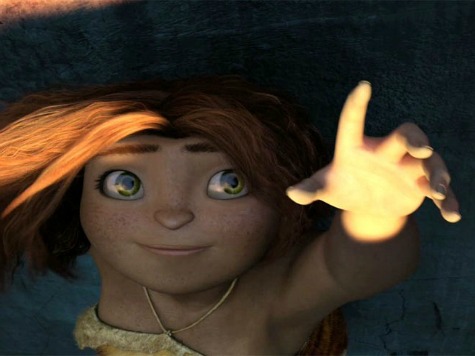
Parents won’t have to worry about wincing through a film directed by Chris Sanders. The animator behind How to Train Your Dragon and the new feature The Croods refuses to add the sort of easy laughs that many kiddie movies offer.
Potty gags, to be blunt.
“I’m just not a fan of that kind of humor. I don’t want to feel uncomfortable and I don’t think you need to resort to that kind of stuff,” Sanders tells Big Hollywood. “The better kind of humor that you might get out of a character is gonna come out of the situation and the personalities.”
The situation in The Croods is a prehistoric predicament, the tale of a cave family grappling with a literally evolving landscape. Father Grug (Nicolas Cage) keeps his kin in a cave as much as possible for safety reasons, leaving it only to forage for food. When a handsome newcomer (Ryan Reynolds) arrives on the scenes, the Croods must consider whether they can sustain their frightened state of mind or explore a friendship with someone new while examining a changing landscape all around them.
The origin of The Croods project dates back to the involvement of Monty Python alum John Cleese (who retains a story credit). The comic icon’s distrust of technology is rooted in the main character’s fear of the unknown.
“The more frightened you are, the more likely you are to survive, so he tries to keep his family afraid pretty much all the time to ensure their survival,” Sanders says. Sounds like Grug is a scold, but Cage manages to make his stoic character one to be embraced, not pushed away.
“You want to sympathize with him. It was native to his voice, you felt sympathy for the poor guy … you feel the weight of responsibility,” says Sanders of Cage, adding the production team watched past Cage films like Raising Arizona and Matchstick Men before deciding he was right for the part.

The film’s theme of not being afraid of change is apparent from the opening sequence, but the kinetic whimsy on display is pure 21st century animation. And Sanders rolled with it.
“We wanted to do for cavemen with this movie what 28 Days Later did for zombies … they’re physically very gifted. They’re fast .. in all other aspects they’re the cavemen you wanna see. Anything out of the ordinary for them is going to be frightening,” he says.
Sanders’ animation legacy includes work on Beauty and the Beast, Lilo & Stitch and The Lion King. He’s partial to fairy tales, and he credits his success, in part, for never fully growing up. He also doesn’t talk down to his target audience.
“I thrived in this environment because I have the right sensibilities in the first place. I never write for kids. The minute you write for a kid people will see that. If you’re changing the dialogue that would be something that would be appealing only for children–that’s something you don’t want to do. You can show a kid any story you want to, you just have to be very careful in the way you unspool it. That said, I never lost sight of this being a family film.”

COMMENTS
Please let us know if you're having issues with commenting.